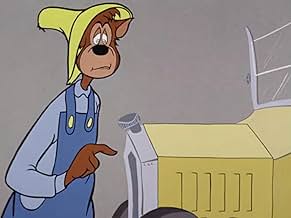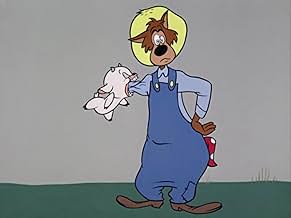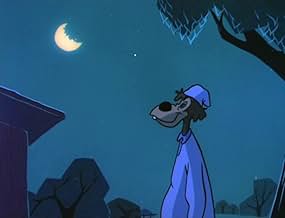A farmer is initially delighted to get a baby goat, but this soon turns to apprehension when he discovers that it eats literally anything (including, at one point, the animation artwork).A farmer is initially delighted to get a baby goat, but this soon turns to apprehension when he discovers that it eats literally anything (including, at one point, the animation artwork).A farmer is initially delighted to get a baby goat, but this soon turns to apprehension when he discovers that it eats literally anything (including, at one point, the animation artwork).
- Directors
- Writers
- Star
Daws Butler
- Farmer
- (voice)
- (uncredited)
- Directors
- Writers
- All cast & crew
- Production, box office & more at IMDbPro
Featured reviews
10serker
This is one of my favorite's as a child, and seeking it out became imperative in the past few years. I always remembered the tune, but never knew the words or the name. Just recently I've discovered what others have been searching for: The song that the farmer is whistling is "Kingdom's Coming (Year of Jubilo)" by Henry Clay Work in 1862.
I always thought that the character had a "yankee soldier" appearance in the other cartoons he appeared in, and that's the initial hint of the civil war era, but I suspect the censors of the time were much too young/ignorant of the history of the song to detect the true "emancipation" of the character. A wealth of stereotypes were used to design this character and elicit responses at the original release date. Only those viewers at an average of 40 yrs or older would have easily grasped the significance of the character, viewers under 20 would not have had the history to view the character other than flat, peculiar, and funny.
The gags are hilarious, the comic sarcasm thick, and the off-stage/on-stage comments are trademark Heck Allen. But the character and mannerisms of the farmer and his song give show much more depth of understanding the audience of the time, and shows that the writers were definitely trying to relate to a specific age group in that audience.
I always thought that the character had a "yankee soldier" appearance in the other cartoons he appeared in, and that's the initial hint of the civil war era, but I suspect the censors of the time were much too young/ignorant of the history of the song to detect the true "emancipation" of the character. A wealth of stereotypes were used to design this character and elicit responses at the original release date. Only those viewers at an average of 40 yrs or older would have easily grasped the significance of the character, viewers under 20 would not have had the history to view the character other than flat, peculiar, and funny.
The gags are hilarious, the comic sarcasm thick, and the off-stage/on-stage comments are trademark Heck Allen. But the character and mannerisms of the farmer and his song give show much more depth of understanding the audience of the time, and shows that the writers were definitely trying to relate to a specific age group in that audience.
Love animation, it was a big part of my life as a child, particularly Disney, Looney Tunes and Tom and Jerry, and still love it whether it's film, television or cartoons.
Also have much admiration for Tex Avery, an animation genius whose best cartoons are animated masterpieces and some of the best he ever did. 'Billy Boy' to me is one of his best, certainly among his funniest and cleverest. The limitations in animation at the time shows at times in some lacking in finesse backgrounds, but Avery still makes the most of these limitations, with so much colour, a lot of visual imagination and characteristically unique character designs that it is easy to overlook. The entertainment value, creativity and clever construction are constant from start to finish.
Characterisation is spot on, the farmer being the slightly funnier character, and the bravura vocal performances do them justice.
Typically, Avery does a wonderful job directing, with his unique, unlike-any-other visual and characteristic and incredibly distinctive wacky humour styles all over it as can be expected.
Once again there is nothing sadistic or repetitious, instead it's imaginative, wonderfully wild and hilarious, as is characteristic of Avery on form. The sarcasm, the on-stage and off-stage comments and the farmer's dialogue are hilariously inspired.
Some limited backgrounds aside, the animation is colourful with some inventive expressive moments. The music, courtesy of Scott Bradley, is lushly and cleverly orchestrated, with lively and energetic rhythms and fits very well indeed, a lot of the action is even enhanced by the music.
Altogether, another Avery classic. 10/10 Bethany Cox
Also have much admiration for Tex Avery, an animation genius whose best cartoons are animated masterpieces and some of the best he ever did. 'Billy Boy' to me is one of his best, certainly among his funniest and cleverest. The limitations in animation at the time shows at times in some lacking in finesse backgrounds, but Avery still makes the most of these limitations, with so much colour, a lot of visual imagination and characteristically unique character designs that it is easy to overlook. The entertainment value, creativity and clever construction are constant from start to finish.
Characterisation is spot on, the farmer being the slightly funnier character, and the bravura vocal performances do them justice.
Typically, Avery does a wonderful job directing, with his unique, unlike-any-other visual and characteristic and incredibly distinctive wacky humour styles all over it as can be expected.
Once again there is nothing sadistic or repetitious, instead it's imaginative, wonderfully wild and hilarious, as is characteristic of Avery on form. The sarcasm, the on-stage and off-stage comments and the farmer's dialogue are hilariously inspired.
Some limited backgrounds aside, the animation is colourful with some inventive expressive moments. The music, courtesy of Scott Bradley, is lushly and cleverly orchestrated, with lively and energetic rhythms and fits very well indeed, a lot of the action is even enhanced by the music.
Altogether, another Avery classic. 10/10 Bethany Cox
Tex Avery's wolf -- voiced by Daws Butler in a southern drawl -- gets a goat, which proceeds to eat everything in sight, and out of it too.
Although this lacks the polished graphics of Avery's early work at MGM, he even has some fun with that. There are lots of things with circular motion, but they're all out of alignment, offering a defiant fist against the usually smooth, and cheaper to animate, of such objects. Other than that, it's a fine example of Avery filling his cartoons with gags that vary on a single theme, without getting in the least tired.
Although this lacks the polished graphics of Avery's early work at MGM, he even has some fun with that. There are lots of things with circular motion, but they're all out of alignment, offering a defiant fist against the usually smooth, and cheaper to animate, of such objects. Other than that, it's a fine example of Avery filling his cartoons with gags that vary on a single theme, without getting in the least tired.
This is a very good Tex Avery short that features his down-home wolf with Southern accent with an echo all his own as he tries mightily to handle an EXTREMELY ravenous sheep named Billy. As funny as the sight gags are, the dialogue (rather, monologue, by the wolf) is hilarious. Well worth tracking down. An unheralded and underrated short. Most Recommended.
Farmer wolf receives a basket with a baby goat and a note that says "He eats anything." He literally eats anything. This Tex Avery animation is top notch. I like this farmer character and I wish he had enough work to warrant an actual name. This is a very simple and fun concept.
Did you know
- GoofsThe windmill originally is shown next to the house, but in a later shot it is missing completely. [However, Billy ate the windmill.] After Billy eats the house, the formerly eaten windmill is now shown between the barns, not next to the house anymore.
- ConnectionsFeatured in Så er der tegnefilm: Episode #17.16 (1991)
- SoundtracksOld MacDonald
(uncredited)
Traditional
Details
- Runtime6 minutes
- Aspect ratio
- 1.37 : 1
Contribute to this page
Suggest an edit or add missing content





















